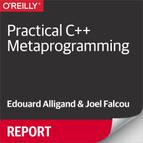Book Description
To say that C++ programmers embrace metaprogramming is a real stretch. Outright rejection is probably more accurate. And yet, C++ template metaprogramming is ideal for performing automatic compile-time optimization. With this example-driven ebook, you’ll learn how improved metaprogramming techniques in C++11 and C++14 can help you avoid a lot of mistakes and tedious work by making the compiler work for you.
Authors Edouard Alligand and Joel Falcou show you how the process works and what it takes to build and apply a basic metaprogramming toolbox. Then comes the real payoff: you’ll learn about a set of existing metaprogramming techniques you can use to perform fast and precise metaprogramming tasks without error—including the Boost.MPL, Boost.Hana, and Brigand libraries.
- Understand basic metaprogramming concepts: programs whose input and output are programs themselves
- Learn how metaprogramming principles can help make your code more compact, generic, elegant, and less error-prone
- Explore how features in C++11 and C++14 make the design of metaprograms easier
- Improve performance, reduce maintenance, and test less often
